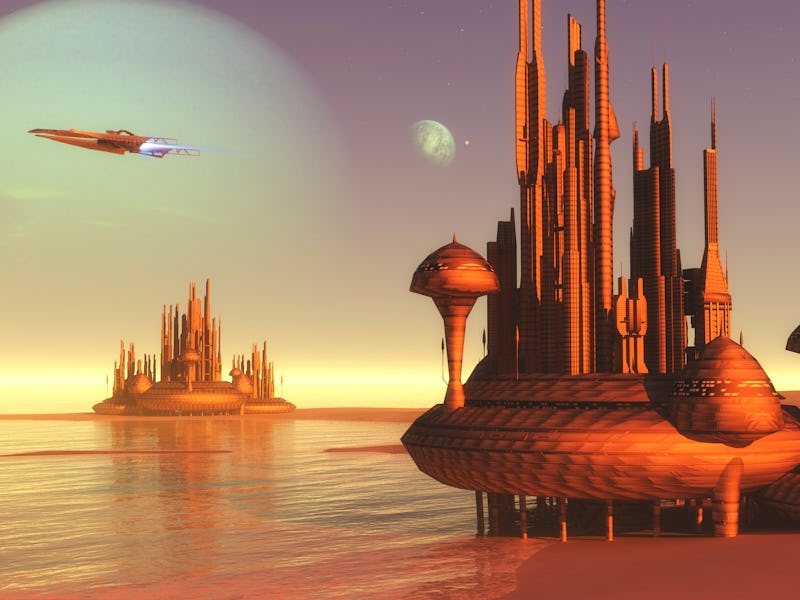Sci-fi author John Scalzi on SpaceX and Elon Musk: “Space travel is elitist”
Scalzi joins Inverse Happy Hour for a special reading from the final book of the Interdependency trilogy.

John Scalzi is an award-winning science fiction author of many, many novels, including his latest work, The Last Emperox, available on (virtual) bookshelves now. He joins Inverse Happy Hour to discuss the final book of the Interdependency trilogy and why, strangely enough, his story about the collapse of a once-great empire didn't start out as a metaphor for our current times.
“There’s lots of politics, lots of personality conflicts, some explosions, some lasers, spaceships — you know, all the good stuff,” he tells Inverse.
Scalzi revealed what working with Star Trek actor Wil Wheaton, the narrator of his Interdependency audio books, is like; why his high schoolmates are excused from reading his current writing; his pre-writing rituals (spoiler alert: stay off Twitter if you want to get anything done); how he uses futuristic language as a vehicle for storytelling; and his thoughts on Elon Musk and SpaceX.
He also took the opportunity to do a special reading of his new book, offering this context for The Last Emperox before diving in:
"Usually the main characters are people at the high levels of society. And so, the part that I’m reading is: what are the common people doing during this time where the empire looks like it’s going to collapse. How are they dealing with it on a day-to-day basis? The section that I’m reading talks a little bit about how they’re dealing with the day-to-day aspects of getting through their life when we’re being told the world may change."
Below are the highlights from Inverse Happy Hour:
On what inspired The Last Emperox— “Weirdly enough, it had absolutely nothing to do with anything current. When you’re a science fiction author, you kind of take weird ideas from wherever and try to bring them up into the future. One day, it was about 2014, I was thinking about what would have happened to the European age of exploration, which was roughly from the 14th century to the 17th and 18th century. If ocean currents and ocean trade winds had just stopped, it would have been able to get to the new world, the new world would have been safe from Europe, and how would history have been different.”
“So that was the initiating sort of thing that I was thinking about, but the funny thing is, if you’re thinking about ocean currents, you’re thinking about climate. If you’re thinking about climate, you’re going to have a thought that is relevant for today’s time. And the more I wrote this particular series, the more sort of reality caught up to what I was doing. So in many ways, I didn’t mean to write something that was relevant to 21st century United States or 21st-century world, but it turns out that that’s what I ended up doing, and I apologize for that because my universe is a terrible place to live in.”
Inverse may receive a portion of sales if you purchase a product through a link in this article. We only include products that have been independently selected by Inverse's editorial team.
On whether humanity should leave Earth— “The thing about us leaving Earth is all very nice, but there’s no other planet that is as good for us as Earth is, and it’s going to be much, much harder to terraform Mars or Venus or Europa or any other moon or planet that you might care to name than it would be just to simply take care of the planet we have. It’s going to be a lot cheaper to take care of this planet than to take a large number of people to the stars.”
“It’s going to be a lot cheaper to take care of this planet.”
“Which is the thing. No matter what, the vast majority of people on Earth are going to stay on Earth. Space travel — and I don’t mean this in a terrible sort of way, but it is absolutely true — space travel is elitist. Space travel is for the very few. Right now, because of the way that we do it through public funding, it’s for astronauts. But astronauts tend to be super confident, you know, they all have master’s, they’re all, like, disgustingly fit physical specimens. So they’re the people that get to go to the stars first.”
“Who are the people who get to go after those people? The billionaires or the millionaires. It’s inherently elitist to get people to the stars. So when people talk about, Oh we need to go to the stars ‘cause that’s going to save humanity? You know, not really, no. What’s gonna save humanity on a large scale is not screwing up this planet that we have. I mean, It’s so much easier, so much cheaper. We could live in a better way than we do or that has less of an impact ecologically, but we just choose not to, because in the short term, there’s money to be made, and in the short term we don’t wanna do it.”
“So maybe yay space exploration and yay not fucking up Planet Earth.”
—
A huge thanks to Scalzi for joining us!